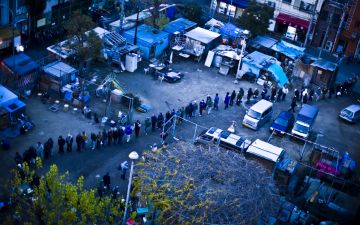One billion people, 30 percent of the world’s workforce, are jobless. Recent political instability, from the Arab Spring to the London riots and Occupy Wall Street protest, all have one thing in common – frustration over unemployment and anger towards the growing gap between rich and poor. Unsustainable employment, and the political turmoil it provokes, is a global crisis.
Once a birthright for the middle class, the 40-hour-a-week job with medical benefits and a pension is fading. Disposable workers – those easily fired without a social safety net – are becoming the norm. Shiho Fukada reports on lives of such disposable workers in Japan, a notable example of a country that has gone through a painful transformation from a lifetime employment system to one that readily discards unwanted labor. She also documents the impact on temporary employees who live in internet cafes, female college graduates who get by as bar girls, and businessmen who, desperate to retain their jobs, sometimes work themselves to death.
Much of the world used to look at Japan’s economy with admiration and jealousy; now they wonder what went wrong. The story of modern disposable workers provides a compelling portrait of the middle-class crisis and global unemployment, especially among the young.
Watch the trailer for the 20-minute documentary produced in collaboration with MediaStorm


